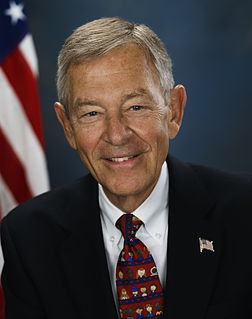A Quote by George Voinovich
I want to make it clear publicly that I expect more candor from this Administration during the next four years, particularly with members on the Foreign Relations Committee so that we can maintain a bipartisan foreign policy.
Related Quotes
Foreign policy always has more force and punch when the nation speaks with one voice. To remain secure, prosperous, and free, the United States must continue to lead. That leadership requires a president and Congress working together to fashion a foreign policy with broad, bipartisan support. A foreign policy of unity is essential if the United States is to promote its values and interests effectively and help to build a safer, freer, and more prosperous world.
I believe on foreign policy that there is little difference between the Democrats and Republicans on the Senate Foreign Relations Committee. We believe that the best course for containing North Korea's nuclear program is through diplomacy, and we disagree with the language the President Donald Trump has used, and the fact that he's made it more difficult for diplomacy to work.
The left, led by the news media, has been telling us practically from the day that Donald Trump announced his candidacy that he would be a complete disaster, particularly in foreign affairs and foreign relations around the world, and even more particularly in the Middle East. And, instead, we see the rave reception that President Trump is getting everywhere he is going, the profound respect.
I would recommend any American who wants to understand where the government is going in the next four years of George W. Bush presidency to get a copy of her confirmation hearings before the Senate Foreign Relations Committee. It's a road map, and it's pretty frightening testimony. Their definition of where democracy should go in the Middle East doesn't include Egypt, Jordan, Saudi Arabia, Pakistan; it only includes Iraq, Iran, and Syria.
This is the problem with foreign policy - talking about foreign policy in a political context. Politics is binary. People win and lose elections. Legislation passes or doesn't pass. And in foreign policy often what you're doing is nuance and you're trying to prevent something worse from happening. It doesn't translate well into a political environment.

































